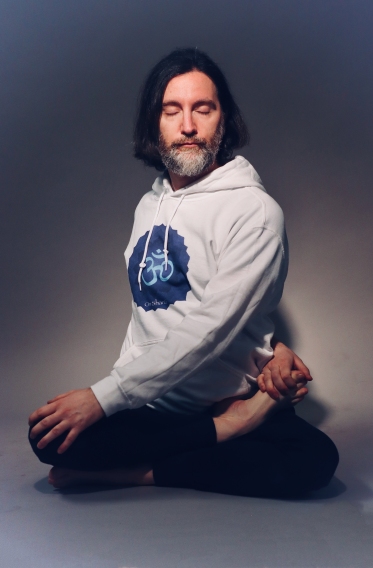WHAT IS SELF-LOVE?
 A very important concept in the yoga philosophy is the one called Atman, which we can translate in English as “self”.
A very important concept in the yoga philosophy is the one called Atman, which we can translate in English as “self”.
The word self though creates often confusion.
It is not unusual to hear people who gravitate in the yoga-world saying things like: “I’m going to practice self-love”.
From the point of view of a traditional Indian Sannyasi (a man devoted to meditation and practitioner of ancient and mainly esoteric forms of yoga) a statement like that would make definitely sense, because according to the tantric philosophy followed by a Sannyasi the self is in fact the Soul, and the soul contains a sparkle of the consciousness of the Universe.
The ancient Greek philosopher Plotinus, who developed a philosophical system similar to the one of the yogis, would say that the self is a microcosm mirroring the Macrocosm. So under this type of perception, the self is something universal, something not relative, something that everybody possess in the same way. It contains the essence of life, and once we connect with it we realise that this essence is present in an equal way also in any other beings existing in the universe.
This philosophical idea can be extremely important also from a moral point of view (so from a point of view that influences our actions).
If we recognise that “the others” have, somewhere inside, the same essence that we have, then it would be very unnatural for us to develop the inclination of willing to hurt them (weather these “others” are animals, people, or other types of beings).
If we look at the way in which the Nazis used to behave, on the other hand, we see that they were having zero problems in hurting and torturing other people, and this happened exactly because they were inspired by a philosophical system that was the exact opposite of the one of the yogis, they were believing to be racially and spiritually superior to anyone else, so their mindset was keeping them away from feeling any empathy or remorse.
This shows how the philosophy that we choose is extremely important and it can deeply influence our behaviours. It is not a case that the first principle of the yoga ethic is Ahimsa (meaning: “to not harm”). The yogis of the past were perceiving their self inside the self of the others, they were feeling connected, so the last thing they wanted to do was to create sufferance in that collective, essential self.
Under the light of this moral philosophy the expression “to practice self-love” means to love our essence and to love our essence means to love the essence of the others, too.
The problem is that the word “self”, in the Western culture, is not necessarily understood as “spiritual essence” but rather as “ego”. So when somebody says that is going to practice self-love often he means that is going to give himself some kind of pleasure that is satisfying his ego.
What is the difference between the ego and the self?
The self is neutral, is a spiritual essence which gives us an objective feeling, an experience of awareness of being alive, an experience of consciousness.
While the ego is an identification with a social role, or with a quality, so it is something relative, mutable, changeable. Sometimes we identify with our name, sometimes with our body, sometimes with our social status, sometimes with our actions. So, this identification is not objective, is not neutral, is not essential, it is relative, it depends on where we are, on how we are, with whom we are, etc.
The ego is basically the mask of the self.
So when we practice ego-love believing that we practice self-love, we are actually distancing ourself from our real essence, and as well from the essence of the others. As a consequence we lose empathy and compassion, and we start to experience different forms of sufferance.
We suffer because we liked the forms that our ego used to have yesterday, for example. Maybe yesterday we were wearing a nice shirt and somebody gave us a compliment for that, so we identified ourself with that experience and we limited our happiness to that particular cloth and to those compliments that we have received.
If, for some reason, we can’t wear that shirt again (maybe our body is overweight or underweight, or perhaps that shirt is damaged, etc), then we start to feel sad. That mask of the self is vanished, evaporated, and we don’t know anymore with what we have to identify ourself to experience again the pleasure that we felt when we received that compliment.
So we buy new clothes… We train our body to become more fit… etc.
Our essence though, our real self, was the same all along, before, during and after receiving the compliment.
Same self, with or without clothes, with or without an overweigh/underweight body.
So the ego and the self are obviously two very different things.
If I am in contact with my real self, and I recognise that essential self also in the people around me, I would be happy to do actions that will make those people safe and happy. On the other hand, if I am in contact only with my ego, I will feel annoyed when I have to change something in my life to make happy someone else (I don’t recognise myself in others, and I am afraid of losing my pleasures while I have to apply some change in my life).
If we put this in the context of the Covid times in which we are living now, perhaps all this might explain why so many people who gravitate around the Western yoga-world tend to be so much against the restriction put in place to contain the Covid epidemic, they don’t seem to be able to recognise their self, their essence, in the essence of the people around them. So the people who might become very sick if they catch this disease are perceived as unimportant, far, and somehow spiritually inferiour. Elderly people, people with pre-conditions, people with an unfortunate karma, anyone that for a reason or another becomes very ill.
Part of our Western society seems to have misunderstood the self with the ego.
Perhaps we could solve this social conflict related to the epidemic trying to practice more self-love and less ego-love?
